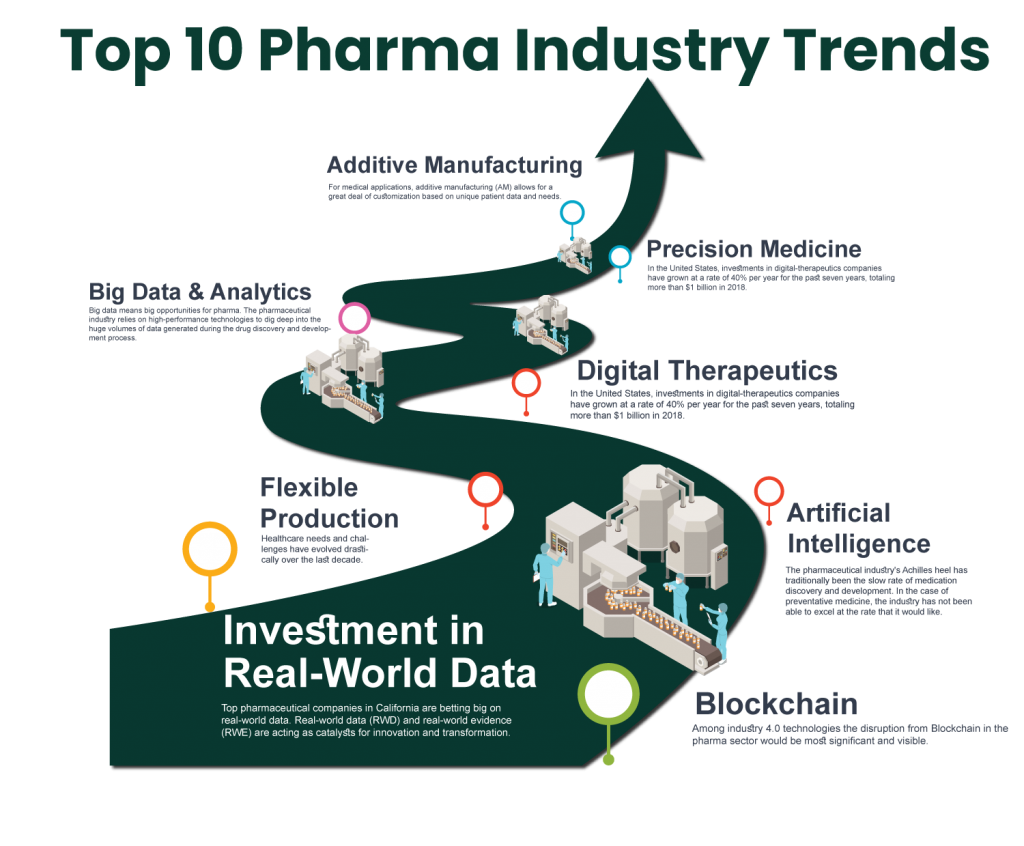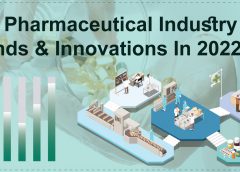The pharmaceutical sector is undergoing a major transformation. Powered by industry 4.0 evolution, the pharmaceutical industry, which had been slow to accept technology in the past, is currently undergoing fast change. Top 100 pharmaceutical companies in California are betting big on new-age technologies. More investments, the growth of technological startups, increasing collaborations, and a favorable regulatory environment, are all encouraging pharmaceutical innovation.
Top 10 Pharma Industry Trends
- Blockchain
- Investment in Real-World Data
- Artificial Intelligence
- Flexible Production
- Digital Therapeutics
- Big Data & Analytics
- Additive Manufacturing
- Precision Medicine
- Curative Therapies
- Extended Reality
Top 10 Pharma Trends in 2022

1. Blockchain
Among industry 4.0 technologies the disruption from Blockchain in the pharma sector would be most significant and visible.
The pharmaceutical business benefits greatly from blockchain technology at every level of drug development and distribution. Because of the sensitive nature of the data, stakeholders in the pharmaceutical sector are notoriously discreet about their information. A blockchain is a viable tool for tracking and safeguarding the pharma transaction ecosystem.
Some of the big names among the top 100 pharmaceutical companies in California are betting on blockchain for:
â— Fixing global supply chain vulnerabilities.
â— Accelerating collaborations among companies
â— Reducing fraud and assuring product authenticity
2. Investment in Real-World Data
Top pharmaceutical companies in California are betting big on real-world data. Real-world data (RWD) and real-world evidence (RWE) are acting as catalysts for innovation and transformation.
The pharma sector is being restructured by the availability of real-world data provided by the Internet of Things (IoT), sensors, and wearable’s. RWD contains information about a patient’s health, treatment information, and health reports that are collected regularly.
3. Artificial Intelligence
The pharmaceutical industry’s Achilles heel has traditionally been the slow rate of medication discovery and development. In the case of preventative medicine, the industry has not been able to excel at the rate that it would like. Pharmaceutical discovery can now be transformed and accelerated thanks to sophisticated AI tools and approaches. Artificial intelligence is assisting industry players in accelerating research and development, lowering medicine prices, and increasing FDA approval rates. AI approaches may also aid in the repurposing of new medications, which will be useful during the COVID-19 outbreak.
In the discovery and development of drugs, particularly in clinical trials, patient identification is critical. To recruit patients for clinical trials, pharmaceutical corporations use artificial intelligence. While AI may be used to analyze clinical trial data, it can also be utilized in the pharmaceutical industry to find people who will take them.
4. Flexible Production
Healthcare needs and challenges have evolved drastically over the last decade. The conventional pharmaceutical production methods are rigid and incapable of adapting and evolving. More so, since the Covid-19 pandemic, there has been a greater focus on inventions that allow vast amounts of goods to be manufactured in a fraction of the time it would take in a traditional setting.
A flexible manufacturing system (FMS) allows industry players to increase or decrease production as per demand. To lower manufacturing costs and make the most use of it, it relies on computer administration and merges multiple production models.
Further flexible manufacturing decreases energy usage, boosts productivity and reduces waste.
5. Digital Therapeutics
In the United States, investments in digital-therapeutics companies have grown at a rate of 40% per year for the past seven years, totaling more than $1 billion in 2018. 2 The growing demand for digital-therapeutic products and tools across the healthcare ecosystem has piqued the interest of investors and top pharmaceutical companies in California alike.
To prevent, manage, or treat a medical ailment or disease, digital therapeutics employ software to give evidence-based treatment interventions. Digital therapies, broadly defined, might encompass the millions of health and wellness wearables and applications on the market, but the technology used to illustrate the effectiveness of pharmacological therapy and for drug research is significantly more advanced.
6. Big Data & Analytics
Big data means big opportunities for pharma. The pharmaceutical industry relies on high-performance technologies to dig deep into the huge volumes of data generated during the drug discovery and development process.
Data management and security are critical areas of concern for pharmaceutical businesses because they need third parties to share data with collaborators. But thanks to big data and analytics solutions historical and real-time data are becoming valuable assets for pharmaceutical companies.
Big data is disrupting all key aspects of the business including:
â— Controlling drug reaction
â— Reduced R&D costs
â— Effective clinical trials
â— External and internal collaborations
â— Escalated drug discovery
7. Additive Manufacturing
For medical applications, additive manufacturing (AM) allows for a great deal of customization based on unique patient data and needs.
Because it may manufacture individualized or unique dose forms, as well as more sophisticated drug-release profiles, additive manufacturing (AM) or 3D printing, can be an innovative alternative approach for developing controlled release dosages.
By depositing material according to computerized 3D design data, this technique creates parts layer by layer.
A great deal of effort is being put into developing powerful 3D printers capable of producing tissues or cells. The 3D printing of human tissues is beneficial to drug development, organ engineering, and regenerative medicine. This allows for the development of age- or physiology-dependent medicinal formulations.
Aside from personalization, additive processes can also be used to eliminate the need to hand-make several versions of a trial medicine.
8. Precision Medicine
Precision medicine is based on the concept of treating each patient as an individual. The ultimate goal, whether at the clinical level or during drug discovery and development, is to adapt treatment to the most appropriate group of patients.
Advances in data analysis are providing new insights into how the human body responds to drugs. Because of this data and advanced manufacturing techniques, personalized medicine is becoming a reality.
Drug exposure models are used to examine the pharmacokinetic and pharmacodynamic properties of drugs to determine the proper dosage depending on age, sex, comorbidities, and other clinical information.
9. Curative Therapies
In the field of illness treatment, there is a paradigm shift occurring from disease management to disease cure. Curative technologies like cell and gene therapies are revolutionizing how we treat chronic diseases and difficult-to-treat ailments by removing the need for long-term care. Gene therapy involves inserting genetic material into cells to compensate for defective genes or to produce a good protein.
10. Extended Reality Technology (XR)
Extended reality(XR) is transforming medicine and patient care like never before.
Mixed reality (MR), virtual reality (VR), and augmented reality (AR) technologies are being investigated by pharmaceutical entrepreneurs in the areas of research and manufacturing.
Extended reality(XR) has multiple use cases in the healthcare sector. The primary among these include:
â— Developing surgery simulator for training medical providers
â— Facilitating collaborations among multiple surgeons using an XR-based immersive interactive app solution
â— Accelerating product development, testing, and delivery
Covid-19 and The New World Order
The COVID-19 epidemic has caused all businesses, especially pharmaceutical corporations, to reassess many elements of their operations, including manufacturing and supply chains. To respond to such large-scale and high-pressure demands, the pandemic underlines the need to improve the speed and precision of developing and mass-producing novel medications, treatment approaches, and vaccinations.
In addition, entrepreneurs and scaleups working at the convergence of life sciences research, biotech, and pharma are uncovering novel features of cells and molecules to provide potentially game-changing solutions to the industry and the general public. Moving forward, top pharmaceutical companies in California are expected to leverage most of industry 4.0 technologies for accelerated innovation in healthcare delivery and care.

Leave a Reply
You must be logged in to post a comment.